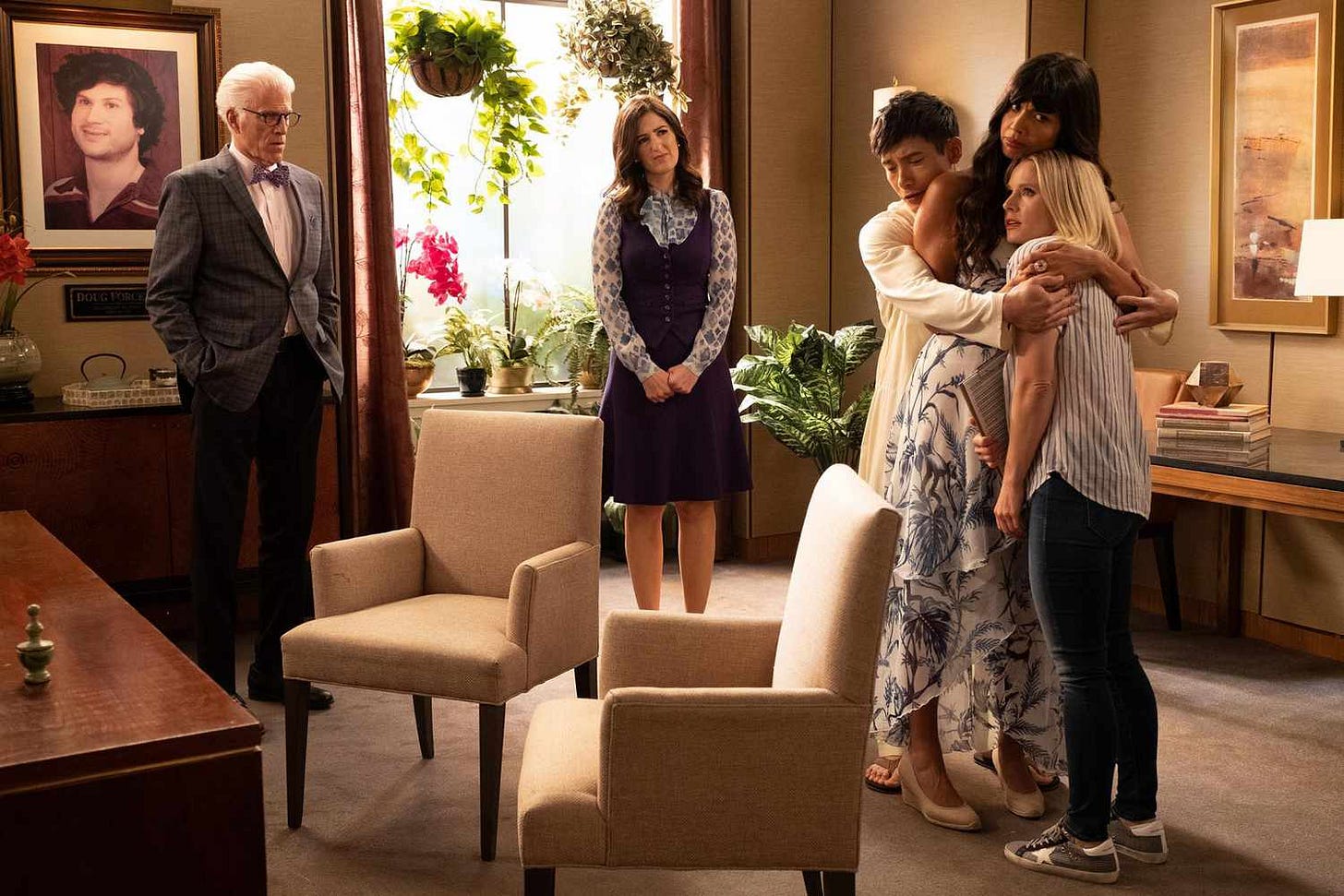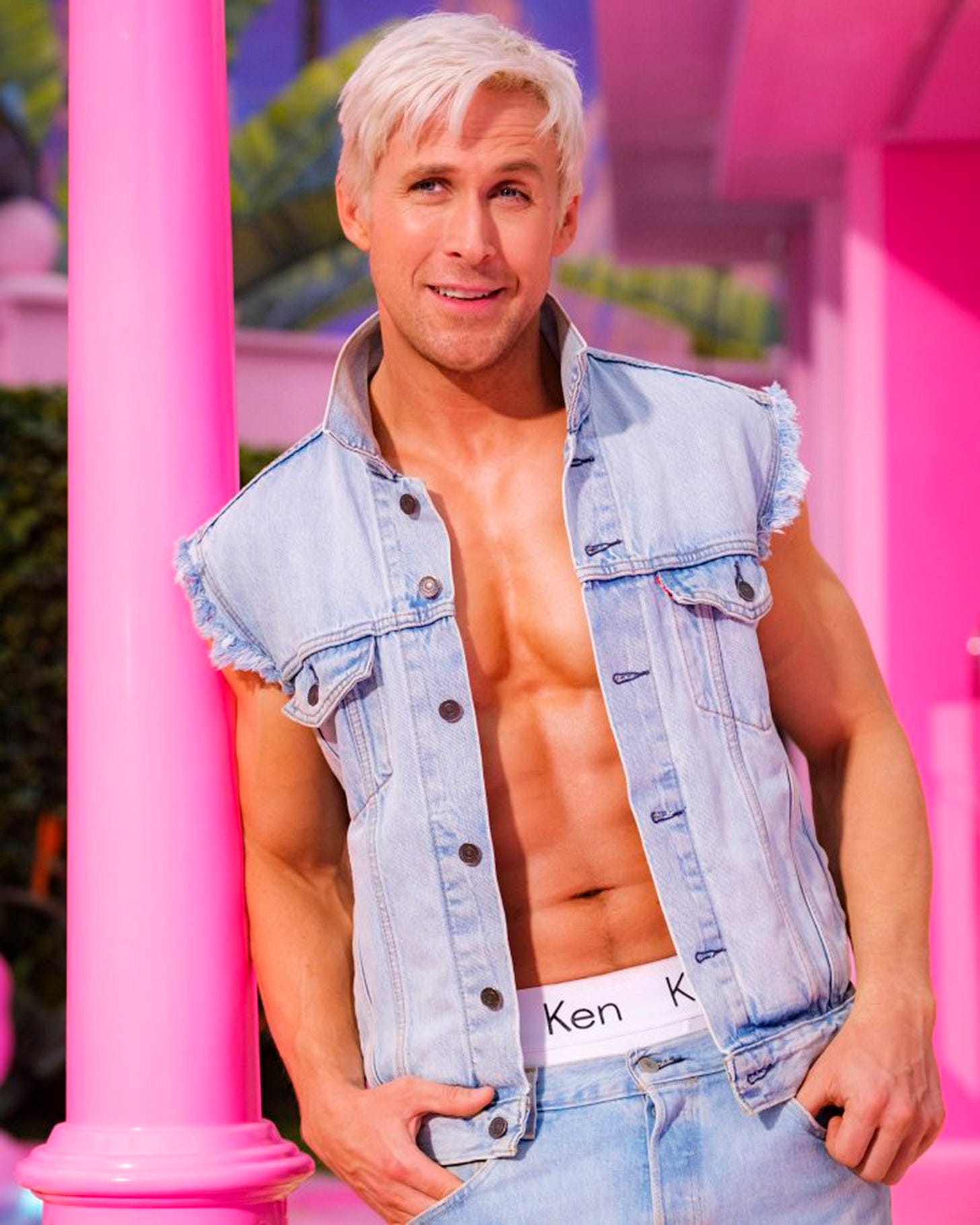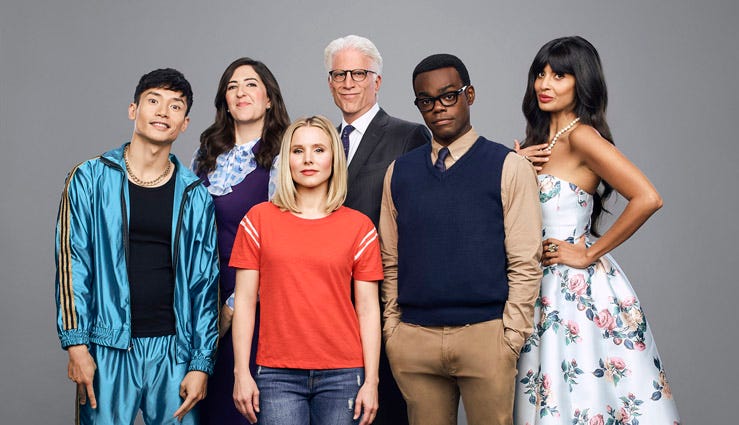How Wokeness Killed Sitcoms: A Retrospective of The Good Place
Altogether, a woke comedy (essentially an oxymoron at this point) will almost always be a predictable and unfunny affair.
With the disastrous performance of the new live-action Snow White, it is now official: the Woke Era for entertainment is over, and the Slop Era has begun. As is his wont, the Critical Drinker best encapsulates this truth with his characteristic humor and insights. While other writers have long been talking about “Slop Culture,” the Drinker differs from them by drawing a distinction between Woke and Slop, though the two certainly overlap.
For the purpose of argument, it helps to define the two. Woke refers to any media outwardly manifesting leftist ideology, particularly the core principles of DEI, progressive feminism, Marxism, and New Age spirituality. A show or movie that is woke will usually feature one or all of the following: a multi-racial cast, a female empowerment and/or self-acceptance narrative, and some kind of criticism of class or social hierarchy.
Slop refers to media that is fundamentally shallow and empty and primarily created to make money—it is the opposite of art. It exploits the dopamine hits that come from excessive spectacle or cheap nostalgia. It is meant to get attention without really saying anything. Most reboots, sequels, and knockoffs that make up the majority of entertainment today qualify as slop (see: the new Minecraft movie).
While I would agree that wokeness has had its day, it’s worth considering its impact on entertainment now that we can finally be honest about it—which was certainly not possible in 2018 when I actually received hate mail for my criticism of girlbosses in Disney Princess movies. While most people tend to look at wokeness’s negative impact on many great franchises (e.g., Lord of the Rings, Star Wars, Marvel), the greatest victim by far is the comedy genre in movies and television, which may never recover.
This is because wokeness is the antithesis of humor. In the interest of being inclusive and equitable, a woke product must be serious, never poking fun at anyone, except maybe the white male villain who ironically becomes the crowd favorite (see Ken in Barbie, or Ron Swanson from Parks and Recreation).
A woke movie or show also cannot depict people as worse than they are in real life, as Aristotle prescribed for comedies in his Poetics. To portray a woman or person of color as anything but upstanding and admirable could be interpreted as bigoted and mean. Again, this inadvertently allows the white male villain to get all the laughs.
Besides being profoundly unfunny, this insistence on presenting people as better than they are severely limits what can be done with the plot and character development. If the protagonist and her friend lack flaws, what is there to do? What conflict is there to resolve? Many comedies involve loser guys trying to become winners, but what if they’ve already arrived?
This leaves two narrow paths: (1) the protagonist can try to fix a broken or corrupt system with the power of her superior kindness and wisdom, or (2) the protagonist goes on a spiritual journey to accept her inner awesomeness. Often, it may be both of these things.
Altogether, a woke comedy (which is essentially an oxymoron at this point) will almost always be a predictable and unfunny affair. There will be preaching sessions aplenty, instantly outdated jokes about fashion and celebrity gossip, and large doses of affirmation and righteous indignation.
The Sitcom Is Dead and The Good Place Killed It
Although Barbie was a good example of this in movie form (as well as a perfect blend of slop and woke), an unacknowledged example of this in television form is The Good Place. For people looking for a decent sitcom that can provide some easy watching and that’s not over two decades old, most critics will inevitably recommend this show.
Airing from 2016-2020, The Good Place was one of the last real NBC sitcoms. It takes its place at the end of a long list of beloved series like Friends, Frasier, The Office, Parks and Recreation, and Brooklyn Nine-Nine. As such, it caters to the same audience of affluent, effeminate, and usually white liberals who listen to NPR, watch Saturday Night Live, and like to feel good about themselves. Nevertheless, the timing of the show makes all the difference because it coincides with the rise of woke culture.
The Good Place has all the hallmarks of a woke show: a perfectly multi-racial cast, an all-inclusive worldview (all religions are equally valid—and also dumb!), and shallow characters who lack serious flaws. The show is about Eleanor Shellstrop (Kristen Bell), a selfish white millennial woman who dies and ends up in Heaven (“The Good Place”) even though she should be in Hell (the "Bad Place”). In order to avoid the Bad Place, Eleanor asks her assigned soulmate Chidi Anagonye (William Jackson Harper), an ethics professor, to teach her how to be good and thus be able to remain in the Good Place.
To be fair, the first season of the show is actually quite funny and entertaining, but only because it’s the least woke. Eleanor really is a terrible person who screws over other people and continues to do so in the afterlife, insulting Chidi and the others constantly. Ted Danson is also good as the bumbling old white Boomer angel charged with overseeing the Good Place. The rest of the supporting cast does fine, but the humor obviously hangs on Bell and Danson.
Sadly, because of twists in the plot subverting the show’s premise, this formula could only hold for one season, and the wokeness inevitably takes over the next three seasons. From then on, Eleanor and the other characters are basically good people, and their goal is to fix a broken system of divine judgment. This leaves little to satirize, as Danson’s character goes from being an interesting antagonist to an emasculated protagonist, and Bell’s character mainly becomes an unlikely guide for others.
This setup ends up exposing just how weak and unfunny the diverse supporting cast is, and the obvious lack of chemistry between them—the show desperately tries to make Eleanor and Chidi a romantic couple, but it never works. None of the situations are realistic or relatable. Jokes that never landed to begin with are recycled and repeated constantly, and smug little jabs at conservatives pop up more frequently.
And, worst of all, the show becomes preachy. It’s all self-affirming, relativistic pablum: be nice, accept yourself, no one’s perfect, and judgement of any kind is unfair and wrong. Sure, the bulk of the show’s audience of irreligious nones, who believe that they’re “good people” because they volunteered for something once and never used racial slurs, might mindlessly nod along with these secular sermons, but not even this crowd can see it as funny.
The wokeness that ruined The Good Place has since spread to every comedy series that came afterward. Perhaps the most noteworthy show has been Abbott Elementary, which despite the hype, proved to be an unfunny dud (as I wrote here and here). It’s the same problem: an unnaturally diverse cast of generally nice characters with no chemistry have little to do, so there’s little to satirize or humiliate. What results are unrealistic scenarios and dull woke preaching.
Is There Any Hope for the Future of Comedy?
Fortunately, all is not lost for the comedy genre. While American (and British) studios learn the hard way about what wokeness does to their product, studios in other countries have avoided this problem, and have even successfully adapted to the streaming format.
Two shows in particular that stand out are Extraordinary Attorney Woo from South Korea and 1670 from Poland. The former series follows the trials autistic young lawyer working for a prestigious law firm Seoul, and the latter concerns the fortunes of a petty Polish noble Jan and his family in a small Polish village in 1670. While both shows manifest a progressive worldview that often mocks tradition, neither of them goes so far as to deny basic reality by adopting woke conventions.
Of course, most Americans would probably prefer not reading subtitles and studying Korean or Polish culture to appreciate the humor of a sitcom. And it’s unlikely that these comedies would translate well to an American audience in any case. Even though wokeness is on the wane, many Americans would still feel uncomfortable with laughing at an autistic person making a mess of things or seeing an all-white cast of Polish people cracking antisemitic jokes.
So it remains to be seen if something comparable will appear on the horizon. I suspect it will take another several years for a genuinely good sitcom to emerge and capture the current moment. Perhaps when people can accept that not all entertainment needs to be a globally appealing blockbuster that requires hundreds of millions of dollars to produce and abounds in woke messaging, a funny sitcom can again become possible.
Until then, I’ll content myself by rewatching the ridiculous yet perfect montage of dimwitted Jan preparing himself for a duel he is sure to lose.
Photo Credits: Warner Bros., Andrew Eccles/NBC, Netflix







Wokeness relies on hatred. It's kind of hard to do good comedy when that is the basis for the jokes.
I think you need to go back and watch The Good Place again. Danson is not an angel. He is a demon, and the place he has set up is an individually designed torture in Hell for the target, Shellstrop, in this instance. As you go thru the seasons, you find there is actually no way to get to the Good Place, something they end up fixing at the end. It's a pretty decent commentary on Heaven and Hell that works despite the wokeness of the casting. And yes, they play on all the racial and ethnic stereotypes, which also works. Surprisingly good considering the setup. Watch it again. Cheers -